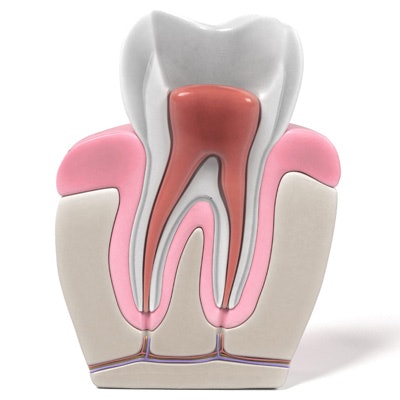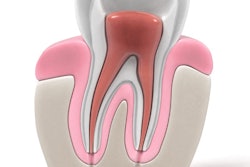
Two new studies examined general dentists' comfort with performing endodontic procedures and what factors affected treatment completion time and rates. Researchers presented their practice management findings on April 26 at the 2018 American Association of Endodontists (AAE18) annual meeting in Denver.
Jennie Harris, DDS, and Rena Kreitman, DMD, both presented findings related to endodontic treatment in general dentists' and endodontists' offices. Drs. Harris and Kreitman are second-year endodontic residents at the University of Iowa College of Dentistry and the Rutgers School of Dental Medicine, respectively.
Older dentists more comfortable with endodontics
The first study looked at whether practicing general dentists use the endodontic training they learned in school or if they rely on continuing education (CE) courses. To find out, Dr. Harris sent a survey to past graduates of the University of Iowa College of Dentistry. About 250 dentists returned the survey, yielding a 11% response rate.
Respondents who were 51 years old or older were far more likely to perform root canals through crowns, retreatments, and apical surgery than younger dentists, she found. Furthermore, survey respondents who attained at least seven hours of continuing education were more likely to perform root canals through crowns.
"Dentists tend to do all procedures and take CE to keep up on their education," Dr. Harris said. "Lots of dentists still use what we taught them in private practice."
One shortcoming of the research was that it only included past graduates from the University of Iowa College of Dentistry. There may also be bias based on who returned the samples and who did not.
Dr. Harris thinks her findings reveal that more experienced clinicians may be willing to try more complex procedures. However, she also hopes that general dentists do not perform endodontic procedures above their comfort level.
"The main message should be to do only the procedures you're comfortable with, and if not, then refer to your local endodontist," she said. "We are here to help and care for your patients."
Symptoms don't influence treatment completion
The second study focused on whether treatment time and completion rates varied for symptomatic and asymptomatic patients who needed nonsurgical endodontic treatment. To find out, Dr. Kreitman looked through electronic health records at the Rutgers endodontic department from July through December 2016. She evaluated time from the initial evaluation to treatment completion for both asymptomatic and symptomatic patients, as well as the insurance used and time until preauthorization was received.
Dr. Kreitman found no differences in treatment completion rates or the time until treatment completion for symptomatic and asymptomatic patients who needed nonsurgical endodontic surgery. However, insurance companies preauthorized treatments faster when claims were submitted electronically compared with other methods.
"Preauthorization was received faster from insurance companies submitted via electronic submission," Dr. Kreitman noted. "Both asymptomatic and symptomatic patients completed treatment at a similar rate and in a similar time frame."


















